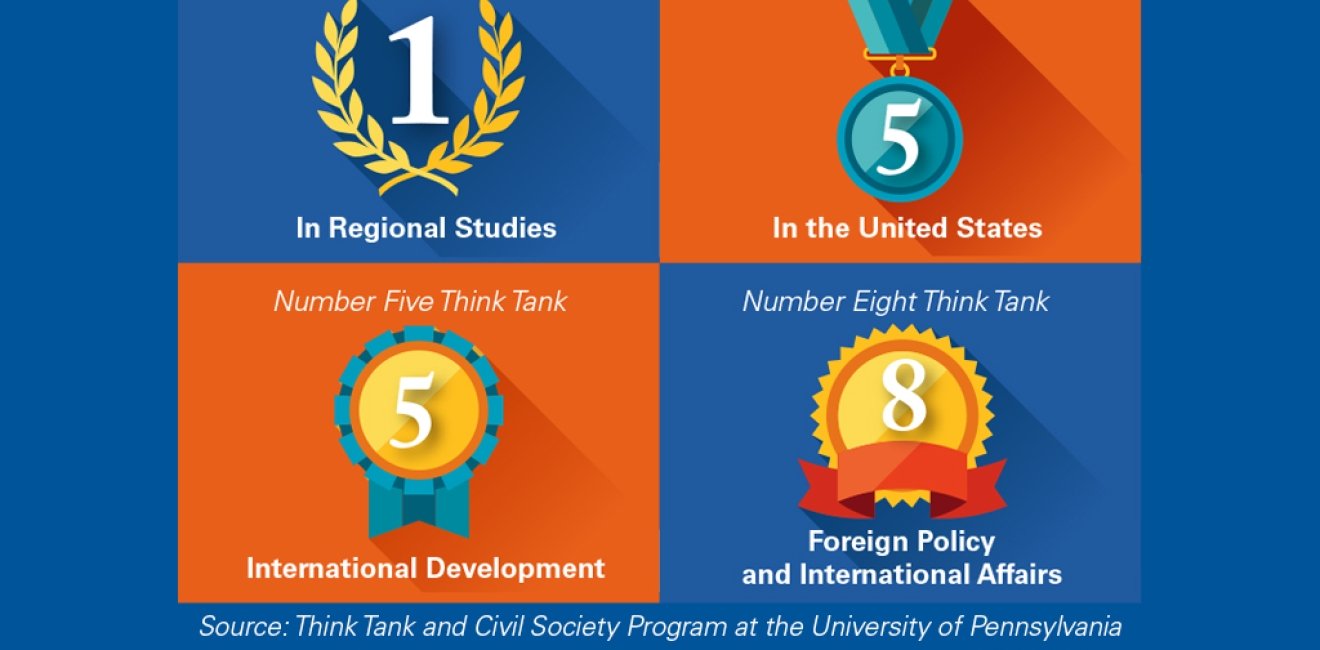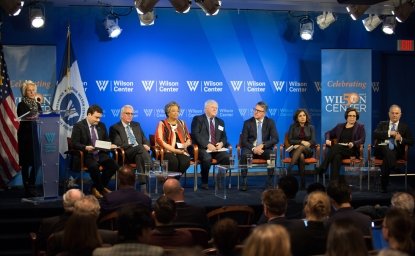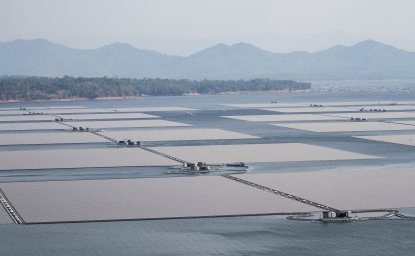[[{"fid":"106796","view_mode":"default","fields":{"field_file_image_alt_text[und][0][value]":"#1 in Regional Studies","field_file_image_title_text[und][0][value]":"","field_file_source[und][0][value]":" ","field_file_caption[und][0][value]":""},"type":"media","attributes":{"alt":"#1 in Regional Studies","class":"media-element file-default"}}]]
PRESS RELEASE
Contact: Ryan McKenna
Phone: (202) 691-4217
ryan.mckenna@wilsoncenter.org
WASHINGTON – For the first time, The Woodrow Wilson International Center for Scholars has been named the #1 regional studies think tank in the world. The designation was announced in the University of Pennsylvania’s highly regarded Global Go To Think Tank Index, which was released today.
“As the Center celebrates its fiftieth anniversary in 2018, no other organization combines authoritative regional analysis and deep historical scholarship to inform and improve the quality of public discourse and policymaking,” said Director, President, and CEO Jane Harman.
The Wilson Center is ranked the #5 think tank in the United States and was again recognized as a leading think tank in transdisciplinary research and as a top think tank to watch.
The Wilson Center is home to 11 regional programs covering nearly every corner of the globe, including:
Kennan Institute: Building and sustaining mutual understanding, cooperation, and exchange among intellectual and opinion leaders in the United States, Russia, Ukraine, and the surrounding countries.
Kissinger Institute: Offering programs for American and Chinese audiences that improve understanding of critical issues in the bilateral relationship to address current and future challenges and promote security and prosperity.
Latin American Program: Fostering new research and exploring policy options to improve outcomes for citizens across the Americas, including in the areas of democratic governance, conflict resolution, citizen security and organized crime, social inclusion, and Latin America's global insertion.
Polar Initiative: Raising awareness and addressing policy challenges concerning the critical issues facing the Arctic and Antarctic, including in the areas of national security and international relations; shipping and infrastructure; environmental protection; maritime capabilities; and investment considerations.
Top-ranked institutions must be autonomous and produce quality research that the University of Pennsylvania survey rates as objective and unbiased.
“The knowledge of our in-house experts is reinforced by the perspectives of 120 visiting fellows representing more than two dozen countries, hundreds of experts participating in impactful meetings, as well as a global network of more than 4,500 alumni,” said Senior Vice President Robert Litwak.
The Wilson Center also examines important issues in thematic programs, including:
Global Women’s Leadership Initiative: Connecting current and emerging women leaders, raising the profile of critical issues, advancing inclusive policies, and bringing new research to the forefront in support of the goal of gender parity in decision-making positions in public service by 2050.
History and Public Policy Program: Examining the dynamic relationship between history and policymaking and fostering open, informed, non-partisan dialogue on historically relevant issues.
The University of Pennsylvania’s Think Tanks and Civil Societies Program has produced the Global Go To Think Tank Index annually since 2007, drawing on the input of nearly four thousand scholars, policymakers, journalists, and funders.
The full rankings are available here.
[[{"fid":"106801","view_mode":"default","fields":{"field_file_image_alt_text[und][0][value]":"Think Thank Rankings 2017","field_file_image_title_text[und][0][value]":"","field_file_source[und][0][value]":" ","field_file_caption[und][0][value]":""},"type":"media","attributes":{"alt":"Think Thank Rankings 2017","class":"media-element file-default"}}]]
Notes to Editors:
1. The Wilson Center was chartered by Congress as the nation’s living memorial to President Woodrow Wilson. Through the work of its staff and fellows, it connects deep scholarship to urgent policy questions.




